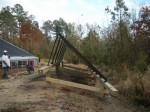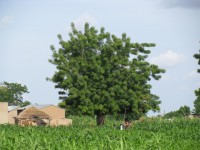School Garden Classrooms
NEEM advocates the use of sustainable plant-based learning across the curriculum. Training teachers to incorporate the use of sustainable outdoor gardens, farm, natural settings and plant activities in their classroom lessons achieve this goal. Our goal is to help make plant-based learning a part of every school child’s education.
NEEM wants to assist groups to plan for, design, install and maintain school community gardens of all styles, purposes, and sizes. The majority of Schools in the United States in the public system are on large portions of cleared unused land that can become a fresh organic resource for each school.
Goals and Objectives
The goals and objectives of NEEM’s school gardening efforts are to help schools establish and develop the following:
- a site leadership team
- participation by local area chefs
- a working garden or farm for use as a living laboratory to support teaching and learning
- a trained teaching faculty with a proven curriculum
- a network of school garden projects throughout the city to provide ongoing support
- a network of parents and community who actively participate in garden activities
- a student body engaging in active discovery through interdisciplinary learning
- membership in the Lets MOVE and Chefs move project
Planning and Design
To achieve these objectives, NEEM will help facilitate a participatory design process with students and teachers prior to garden construction. Meetings with educators and students determine how they wish to use the garden for class activities, where the garden will be located on their school campus, and what features they would like the garden or farm to have. A concept plan is developed from teacher and student ideas to reflect their vision, and this conceptual plan is presented to educators and students for feedback and approval. The school identifies appropriate ownership zones for each classroom wanting to adopt a portion of the garden or farm.

Solar & Green House
Construction and Planting
The Farm or Garden construction focuses on building the infrastructure for planting (raised beds, beds, soil preparation, tree planting, forested plantings etc.). While NEEM works with contractors to accomplish this phase, teachers and students observe the process through tours (at the NEEM greenhouse and on site) and help work out measurements and project materials needs. The second phase of is planting, which is done by the school’s students, teachers, parents, staff and principals with assistance from NEEM and the immediate community. School garden planting days should be celebratory events for everyone involved. NEEM also collaborates with others involved in urban and rural Agriculture who could become involved in those relationships. NEEM is a consultant in agroecological design concepts that maximise on the land available potential to create closed loop off grid systems in harmony with nature. Out of State projects require 5 days for site reveiw and planning where all required components are placed and design completed usually in 30 days.
Teacher Training
Teacher training is integral to the school garden or faqrm becoming part of the school’s sustainable foot print and culture. It is recommended that Teachers attend local sustainable AG workshops that aside from learning create avenues and collaborative relationships. Supplemental training sessions serve to introduce the curricular connections tand illustrate how to weave garden or farm-based activities into existing curricula. NEEM and botanical educators can help teachers determine how they can modify the activities to fit into or replace their current lesson plan. Ideas for particular disciplines (math, reading comprehension, language arts, art, science, and others) are presented. NEEM will provide a curriculum we worked on with teachers, parents, schools and the children that is incredible in the plant based learning piece.
The time is now to insure that as we look to address food security that we insure that sustainable concepts are employed. In the urban sector it has been determined and studied that conventional agriculture with inputs is dangerous to the urban environment and watershed. Sustainable AG in the urban environment is critical and secures students ecological outlook for their future.

